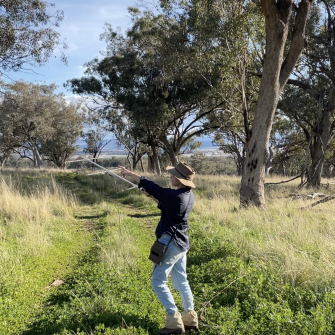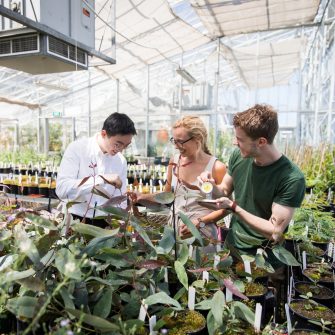Bachelor of Aviation (Remotely Piloted Aircraft Systems)
- Commencing Terms
- Term 1
- Duration
- 3 Year(s)
- Delivery Mode
- Face-to-face (includes blended)
- Campus
-
Other
- Codes
- UAC code 429510
- Program code 3928
- CRICOS code 114591B
-
ATAR/2025 lowest selection rank
- 80.0 View all admission criteria
-
2026 Indicative first year full fee
- $9,500*
-
2026 Indicative full fee to complete degree
- $52,000*
-
2026 Indicative first year full fee
- $62,500*
-
2026 Indicative full fee to complete degree
- $220,500*

Application closures for 2026
International applications for all undergraduate programs, as well as postgraduate programs offered by the faculties of Arts, Design & Architecture, Engineering (excluding Master of Information Technology and associated programs) and Science are now closed to New Overseas Student Commencement (NOSC) for 2026 intakes.
Postgraduate programs offered by the Business School and the faculties of Law & Justice and Medicine & Health remain open. Master of Information Technology (and associated programs) also remain open.
- Overview
- Entry requirements
- What will I study?
- Future careers
- How to apply
- Fees & Scholarships
Bachelor of Aviation (RPAS) overview
Launch your drone operations career at a global top 20 university (QS World University Rankings, 2024–2026). The Bachelor of Aviation (Remotely Piloted Aircraft Systems) – often abbreviated to RPAS – gives you skills and experience to become a drone pilot in Australia. Learn to manage commercial drone operations at scale with systems spread across geographical locations.
This degree builds your expertise in all areas related to drone operations, with an entrepreneurial approach that can prepare you to lead drone or field robotics operations for an existing business. With an aviation degree and remote pilot licence, you could even start your own company, backed by the #1 university in Australia for startups (Survey of Commercialisation Outcomes from Public Research Report, 2023).
Advanced skills in this area are in high demand as the industry evolves to include commercial application of larger drones like uncrewed airplanes – expected within the next decade to join smaller platforms operating in airspace shared by crewed aircraft. Current applications include logistics, environmental monitoring, medical and disaster relief, health and safety management. This forward-thinking program ensures you are ready for both current and future job opportunities in this ever-changing field.
You’ll join UNSW’s leading School of Aviation and learn through a combination of classroom and hands-on learning. Be guided by industry experts, such as Dr. Graham Doig, founder and former CEO of Seaflight Technologies, covering subjects like Drone Operations Management, Drone Information Systems, and Drone Entrepreneurship. Our academics and industry partners will help you develop the knowledge and problem-solving skills to thrive in your drone career in any sector.
Why study remotely piloted aircraft systems at UNSW?
Build broad expertise in a rapidly evolving industry
The Bachelor of Aviation (RPAS) prepares you for leadership roles in one of the fastest-growing areas of aviation studies. You’ll gain in-depth knowledge in aviation safety, airspace management, aviation law and human factors – ensuring you graduate ready to manage both crewed and unmanned aerial systems (UAS) in shared airspace.
Train with industry experts and advanced flight tech
Through a mix of theory and hands-on sessions, you’ll master drone operations management, imagery analysis and programming. With 20+ hours of certified drone pilot training, you’ll gain experience flying multirotor, fixed-wing and vertical take-off and landing (VTOL) systems – including beyond visual line of sight (BVLOS) missions. UNSW’s partnership with the Australian Uncrewed Aerial Vehicles Service (AUAVS) also gives you access to commercial drone operations in search and rescue and marine surveillance.
Learn from aviation leaders and startup founders
Our aviation courses are designed and taught by experts from organisations like the Civil Aviation Safety Authority (CASA), Qantas and Airservices Australia, as well as drone startup founders. You’ll study with educators at the forefront of drone technology and autonomous flight, who are helping shape national policy and regulation for large drones and UAV systems in commercial use.
Turn innovation into opportunity
As part of Australia’s top university for startups (Survey of Commercialisation Outcomes from Public Research Report, 2023), you’ll learn how to build viable drone businesses. Explore operational models, develop startup ideas and work on interdisciplinary projects that put you in control of commercial outcomes. With connections to alumni-led companies like Aerologix and Seaflight Technologies, you’ll be ready to lead or launch in a rapidly growing sector.
Want to see more from UNSW Science?
What are the entry requirements for the Bachelor of Aviation (RPAS)?
-
- The 2025 Lowest Selection Rank (LSR) is the adjusted rank (ATAR plus adjustment factors) you would have needed to gain entry to this degree in 2025.
- The 2025 A levels score is based on four Advanced Level (A2) subjects. Entry scores are calculated from the best three or four A2 subjects (excluding repeated subjects) using the following values: A*=6, A=5, B=4, C=3, D=2, E=1. At most one Applied A Level subject may be included in the best four subjects used to calculate the aggregate.
- The 2025 IB Diploma is an indication of the IB you would have needed to gain entry to this degree in 2025. It is to be used as a guide only.
- The 2025 Lowest ATAR is the lowest ATAR (before adjustment factors were applied) to which an offer was made. Where <5 is listed, this indicates that less than 5 ATAR-based offers were made and so the score has not been published. N/A indicates no offers were made on the basis of ATAR.
*The Lowest ATAR to which an offer was made, for this program, is based on a UNSW Gateway Early Conditional Offer.
-
At UNSW, we are committed to ensuring prospective students have all the information they need in order to make informed decisions about their study options.
To assist you in gaining a better understanding of how Admissions works at UNSW, we have provided you with a summary of ATAR offers and the student profile.
We hope this information will help you identify the degree that is right for you.
Assumed knowledge
Mathematics Advanced
Adjustment Factors
We offer a range of adjustment factor schemes that reward students for academic performance and extra-curricular achievements. These schemes also take into account a range of personal and educational disadvantages that may have affected your studies.
HSC Plus
This scheme rewards students who perform well in Year 12 subjects that are relevant to their preferred UNSW degree. You may be awarded up to five points.
Elite Athletes, Performers and Leaders (EAPL)
This program recognises achievements in the areas of sport, academia, leadership and music at an elite level. You may be eligible for up to five points.
Educational Access Scheme (EAS)
Factors such as illness, financial hardship, language difficulties or attending a particular school can mean you don't always get the best possible marks in Years 11 and 12. If one of these situations applies to you, submit an application for the Educational Access Scheme (EAS) via UAC. Eligible students can receive between 1 and 10 points towards their chosen UNSW degree.
Admission pathways
Your ATAR is not the only measure of your potential to succeed, which is why we offer a range of pathways into university. Explore your options below and get in touch with our Future Student Advisers to discuss your path to UNSW.
Gateway Admission Pathway
This scheme is open to students who attend Gateway schools, live in a low-socioeconomic area based on IRSAD and IEO indexes of SEIFA criteria, or are an Aboriginal and Torres Strait Islander person. It adjusts the ATAR requirements for your preferred UNSW degree and provides early offers and early conditional offers to UNSW.
Entry programs for Australian Aboriginal and Torres Strait Islander people
We offer entry programs for Indigenous Australians, including the Indigenous Preparatory Programs and the Indigenous Admission Scheme (IAS). The entry pathway program you apply for will depend on the degree you want to study.
English language requirements
You may be asked to provide evidence of your English proficiency to study at UNSW depending on your educational background and citizenship. English language skills are vitally important for coping with lectures, tutorials, assignments and examinations - this is why UNSW requires a minimum English language competency for enrolment.
If you’re completing an Australian Year 12 qualification (e.g. NSW HSC or equivalent), you do not need to provide anything extra to prove your proficiency. Your qualification will be used as evidence of your English proficiency.
If you do need to provide evidence of your English proficiency, this will be indicated in your application. You can prove this by providing evidence that you meet one or more of the following criteria:
- English language tests and university English courses
- Prior study in the medium of English
- Other qualifications
If you need to improve your English skills before you start your degree, UNSW College’s Academic English Programs are for you. The programs are suitable for various English levels and help you prepare for university studies and life in Australia.
For more details, visit the English Language Requirements page.
International direct entry
Information for applicants with CBSE, HKDSE or Singapore A Levels Qualification
Calculating your CBSE Score:
Awarded by CBSE, average percentage marks across English or Hindi, and your best four remaining subjects. Where marks are given as a range, the mid-point for that range is used e.g. 75 to 80 = 77.5.
Calculating your HKDSE Score:
Entry requirements are based on the aggregate of the best 5 achieved category A subjects (category B and C subjects are not considered).
For subjects other than Citizenship and Social Development: level 5**=7 points, level 5*=6 points, level 5=5 points, level 4=4 points, level 3=3 points, level 2=2 points, level 1=1 point, Level U=0 point.
For subject Citizenship and Social Development: Attained=2 points, Unattained=0 point. Citizenship and Social Development will only be counted towards the aggregate if the 2 points awarded for Attained ranks among the student’s best five scoring subjects.
If Mathematics Compulsory Part and Extended Part (Module 1 or 2) are both presented, both scores can be counted.
Calculating your Singapore A Levels:
Due to significant changes to the GCE A-Level Curriculum and University Admissions Score (UAS) calculation effective 2026, UNSW assessment is currently under review.
Note: Entry requirements published on this page are correct as of the day of publication and may change without notice.
We do not accept secondary qualifications from this country. We may accept tertiary study results, please contact us for more information.
Please contact us for direct entry requirements.
Admission pathways
If you do not meet the requirements for direct entry into your chosen degree, you may be eligible for a pathway program with UNSW College. UNSW College provides alternative entry options using university-approved content so that you can start your UNSW journey with confidence.
English language requirements
You may be asked to provide evidence of your English proficiency to study at UNSW depending on whether you are from an English-speaking background or non-English speaking background. English language skills are vitally important for coping with lectures, tutorials, assignments and examinations - this is why UNSW requires a minimum English language competency for enrolment.
If English is not your first language, you’ll need to provide proof of your English proficiency before you can be given an offer to study at UNSW. You can do this by providing evidence that you meet one or more of the following criteria:
- English language tests and university English courses
- Prior study in the medium of English
- Other qualifications
If you need to improve your English skills before you start your degree, UNSW College’s Academic English Programs are for you. The programs are suitable for various English levels and help you prepare for university studies and life in Australia.
For more details, visit the English Language Requirements page.
Check the specific English language requirements for this program
UNSW is introducing a new academic calendar from 2028.
We are moving to a new flex-semester calendar. What does this mean for your studies?
What will I learn in the Bachelor of Aviation (Remotely Piloted Aircraft Systems)?
Program structure
The Bachelor of Aviation (RPAS) at UNSW combines science, technology and real-world application to prepare you for a leadership role in the fast-evolving drone sector. Across three years of full-time study, you’ll build expertise in drone systems, airspace management, aviation law, human factors and aviation safety – all while gaining practical experience in drone flight and remote piloting.
This program is ideal for those who want to operate, manage and innovate in the world of remotely piloted aircraft systems. With a focus on technical knowledge, regulatory compliance and entrepreneurship, you’ll graduate with the tools to succeed in remote pilot jobs, startup ventures or integrated aviation roles.
-
The RPAS program includes 126 units of core courses covering a range of topics essential to modern drone operations. You’ll study aviation science, drone information systems, drone entrepreneurship and aviation transport policy. Courses also explore UAV systems, drone technology and the legal and ethical considerations of operating in shared airspace. Your learning will balance theory and simulation, ensuring you can assess risk and make informed operational decisions in complex environments.
-
Throughout your Aviation (RPAS) degree, you’ll complete up to 40 hours of uncrewed flight training. You’ll learn to safely operate multirotor, fixed wing and vertical take-off and landing (VTOL) platforms. Your training includes 20 hours of certified drone pilot training, covering day and night operations and beyond visual line of sight (BVLOS) missions. You’ll also gain experience in logistics, mapping and search and rescue using commercial-grade drone platforms, helping you develop operational skills across a range of real-world applications.
Full program structure
Students must complete 144 units of credit (UOC) to graduate with a Bachelor of Aviation (RPAS). This three-year full-time course includes core courses (126 UOC), prescribed electives (6 UOC) and general education courses (12 UOC).
-
Aeronautical Knowledge (12 UOC)
Simulation in Aviation and Airworthiness Management (6 UOC)
Introduction to Human Factors: The Safety Science of Human Performance (6 UOC)
Aviation Transport Economics (6 UOC)
Improving Communication Skills for STEMM (6 UOC)
Mathematics for Life Sciences (6 UOC)
Statistics for Life and Social Sciences (6 UOC)
-
Commercial Navigation (6 UOC)
Commercial Meteorology (6 UOC)
Commercial Human Factors, Flight Rules and Air Law (6 UOC)
Advanced Human Factors (6 UOC)
Instrument Rating (6 UOC)
Drone Imagery and Sensing (6 UOC)
Drone Information Systems (6 UOC)
Quantitative and Qualitative Research Methods in Aviation (6 UOC)
-
Drone Entrepreneurship (6 UOC)
Airline Management (6 UOC)
Aviation Safety and Resource Management (6 UOC)
Flight Data Analytics (6 UOC)
Aviation Research Methods (6 UOC)
Students must choose one of the following:
Human Factors Tools and Methods (6 UOC)
Aviation Work Placement 1 (6 UOC)
Environmental Performance Evaluation of Aviation: Theories and Techniques (6 UOC)
Students must also complete 12 UOC of general education courses outside the Faculty of Science.
How is flight training for remotely piloted aircraft delivered at UNSW?
UNSW’s flight training is delivered in partnership with certified providers and meets CASA certification standards. Your practical training includes industry-relevant equipment and scenarios, conducted in safe, controlled environments. You’ll graduate with a Remote Pilot Licence (RePL) and additional qualifications for operating heavy-lift drones (up to 150kg) across multiple aircraft types, including fixed-wing and multirotor systems.
What careers can I pursue with a Bachelor of Aviation (Remotely Piloted Aircraft Systems)?
Australia was one of the earliest adopters of drone technology. As industries move towards large-scale operations with various drones, demand for qualified professionals is growing. Drone pilots need to understand all aspects of managing drone operations and be prepared for uncrewed systems operating alongside crewed aircraft. Thousands of new jobs related to drone operations are predicted to be created in Australia alone between now and 2030, including for emergency services, defence, surveying, conservation, entertainment, logistics and safety management.
Entrepreneurial graduates can start their own businesses, offering commercial operations to meet demand or creating new market opportunities with innovative technology or services. UNSW Founders, Australia's top startup accelerator, can help. Drones are the fastest-growing sector in aviation, making it the perfect time to launch your company by the time you graduate.
Potential careers
Chief remote pilot
Drone operations manager
UAS flight coordinator
Drone services business owner
Drone startup founder
Aerial, ground, or underwater robotics operator
Drone logistics manager
First responder drone coordinator
Remote pilot in charge
Uncrewed aircraft flight test specialist
Drone mapping and LIDAR analyst
Program manager – drone and 3d data
UAS flight operations lead
Counter drone specialist
Multi-vehicle supervisor (MVS)
- Uncrewed eVTOL or helicopter pilot/operator
Drone mission commander
Industries and applications
Emergency services
Defence
Government/regulatory
Humanitarian aid
Photogrammetry and surveying
Media and cinematography
Medical and disaster relief
Logistics
Conservation and environmental monitoring
Health and safety management
Licences and certifications
As part of your studies in the Bachelor of Aviation (RPAS), you’ll acquire professional credentials that align with the regulatory standards set by the Civil Aviation Safety Authority (CASA). You’ll earn your Remote Pilot Licence (RePL), and you’re also prepared for roles requiring a Remotely Piloted Aircraft Operator’s Certificate (ReOC) or an Aeronautical Radio Operator’s Certificate (AROC). These certifications equip you for commercial drone operations in Australia and ensure your training is future‑proofed for drone fleets, heavy‑lift systems and autonomous flight across shared airspace.
How to apply
Applications for undergraduate study from domestic students (Australian citizens, Australian permanent residents, Australian permanent humanitarian visa holders and New Zealand citizens) are processed by the Universities Admissions Centre (UAC).
Visit the Apply section of the UAC website and you can nominate up to five degrees in order of preference, with the first being your most desired degree and university.
On-time applications for admission usually close at the end of September each year for Term 1 admission. Late applications can be submitted, but a late fee will apply. For study starting in Term 1, the majority of offers are made in December and January. Visit the UAC website for key dates for admission outside of Term 1.
Ready to apply?
For most international students, applications are submitted via our Apply Online service. We encourage you to submit your completed application as early as possible to ensure it will be processed in time for your preferred term.
Some high-demand programs with limited places, may have an earlier application deadline or may have an earlier commencement date. For details, visit the international admissions information page.
*If you are an international student studying an Australian qualification, go to the Universities Admission Centre (UAC) for application and UAC key dates. Note: If you are under 18 years of age, you need to make special arrangements. For details, visit the under 18 international students page.
Ready to apply?
Fees & Scholarships
Commonwealth Supported Place: Student Contribution Band 2
*The student contribution for a Commonwealth Supported Place is an indication only of the amount payable in Year 1 based on a standard full-time load of 48 credit points (1.0 EFTSL). The actual student contribution you will be liable for depends on your individual program of study and the calendar year in which you enrol. Actual fees are calculated upon enrolment. Student contribution amounts are subject to annual review by the university and may increase each year during your studies (subject to caps determined by the Australian Government), effective at the start of each calendar year.
The indicative fees listed here are based on an estimated average and are for tuition only - other fees and charges are not included.
You’ll need to pay the drone flight training costs portion of this degree. In 2025, the anticipated standard cost of 40 hours of drone flight training for the Remote Pilot Licence and Commercial Experience component is $19,438. Students will be notified of their drone flight training costs in the year they commence their degree.
*Fees are subject to annual review by the University and may increase annually, with the new fees effective from the start of each calendar year. The indicative fees listed here are based on an estimated average and are for tuition only, other fees and charges are not included. The amount you pay will vary depending on the calendar year to enrol, the courses you select and whether your study load is more or less than 1 Equivalent Full Time Student Load (8 courses per year).
Indicative fees are a guide for comparison only based on current conditions and available data. You should not rely on indicative fees. More information on fees can be found at the UNSW fees website.
Indicative fees to complete the program have been calculated based on a percentage increase for every year of the program. Fee increases are assessed annually and may exceed the indicative figures listed here.
Indicative fees to complete the program include tuition plus an estimate of study-related costs of approximately $1,000 per year. To find out more about other costs, visit UNSW International.
You’ll need to pay the drone flight training costs portion of this degree. In 2025, the anticipated standard cost of 40 hours of drone flight training for the Remote Pilot Licence and Commercial Experience component is $19,438. Students will be notified of their drone flight training costs in the year they commence their degree.
Scholarships
At UNSW, we award over $83 million in scholarships each year. We pride ourselves on rewarding excellence and making university accessible to students from all walks of life. Whether you’re a domestic or international student, our range of scholarships, prizes and awards can support your journey.
Featured scholarship
- SYD100 Scholarship
The Sydney Airport SYD100 Scholarship has been established to support educationally disadvantaged students undertaking study with UNSW Aviation. This scholarship covers full tuition fees for four years and $25,000 towards residential fees (where relevant). - Women in Aviation International Award
We're proud to partner with Women in Aviation International to offer an exclusive scholarship for high-performing female students enrolling in this program with up to $15,000 to cover your hands-on training, so you’ll be prepared to start your career with the experience and certifications that put you ahead. This is your opportunity to break barriers, develop cutting-edge skills and join a global community of women shaping the future of aviation in drone operations and entrepreneurship. Whether you're passionate about aerial surveillance, emergency response, environmental monitoring or commercial operations, our program combines hands-on flight training and research testing with industry connections to launch your career — and maybe even your own business — in uncrewed aviation.
Featured scholarship
- SYD100 Scholarship
The Sydney Airport SYD100 Scholarship has been established to support educationally disadvantaged students undertaking study with UNSW Aviation. This scholarship covers full tuition fees for four years and $25,000 towards residential fees (where relevant). - Women in Aviation International Award
We're proud to partner with Women in Aviation International to offer an exclusive scholarship for high-performing female students enrolling in this program with up to $15,000 to cover your hands-on training, so you’ll be prepared to start your career with the experience and certifications that put you ahead. This is your opportunity to break barriers, develop cutting-edge skills and join a global community of women shaping the future of aviation in drone operations and entrepreneurship. Whether you're passionate about aerial surveillance, emergency response, environmental monitoring or commercial operations, our program combines hands-on flight training and research testing with industry connections to launch your career — and maybe even your own business — in uncrewed aviation.
Progress starts here – at a world-leading university

Top 20 Worldwide
UNSW is ranked #20 university in the world
QS World University Rankings, 2024–2026

Most Employable Graduates
Winner of the AFR Most Employable University Award six years in a row
AFR Top100 Future Leaders Awards, 2020–2025

Australia's #1 for Innovation
Highest number of startups and spinouts from university-developed tech
SCOPR report, 2024





